Your Cart is Empty

Culture cupboard coconut yogurt recipe
Barb Hodgens
Barb Hodgens loves to cook with alternative, healthy whole food ingredients, with a focus on gut health. Barb has overcome her own gut health issues through healthy eating. Share your ideas, comments and photos at the end of this post :)
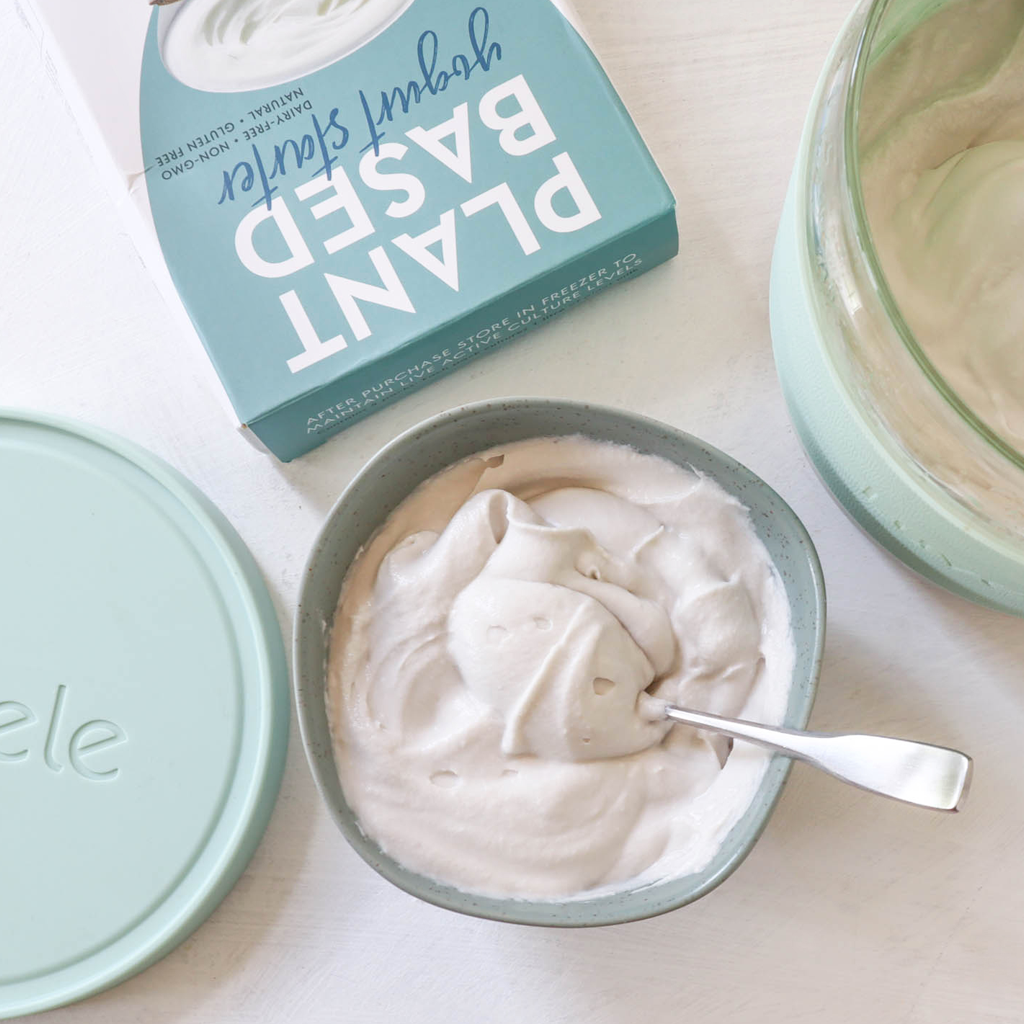
A plant-based yogurt made easy.
Looking for an easy coconut yogurt recipe? This homemade Culture Cupboard coconut yogurt method is just that and is guaranteed to turn out delicious, creamy yogurt, every time. Culture Cupboard Plant Based Starter contains everything you need to ensure probiotic rich yogurt with great texture. It’s everything you love about yogurt, without the dairy!
STARTER CULTURE
Culture Cupboard’s Plant Based Yogurt Starter contains four bacterial strains:
Streptococcus thermophilus
Lactobacillus acidophilus
Lactobacillus delbrueckii subsp.
Bulgaricus bifidobacterium
All the strains are grown in a non-dairy medium so your homemade yogurt will be vegan.
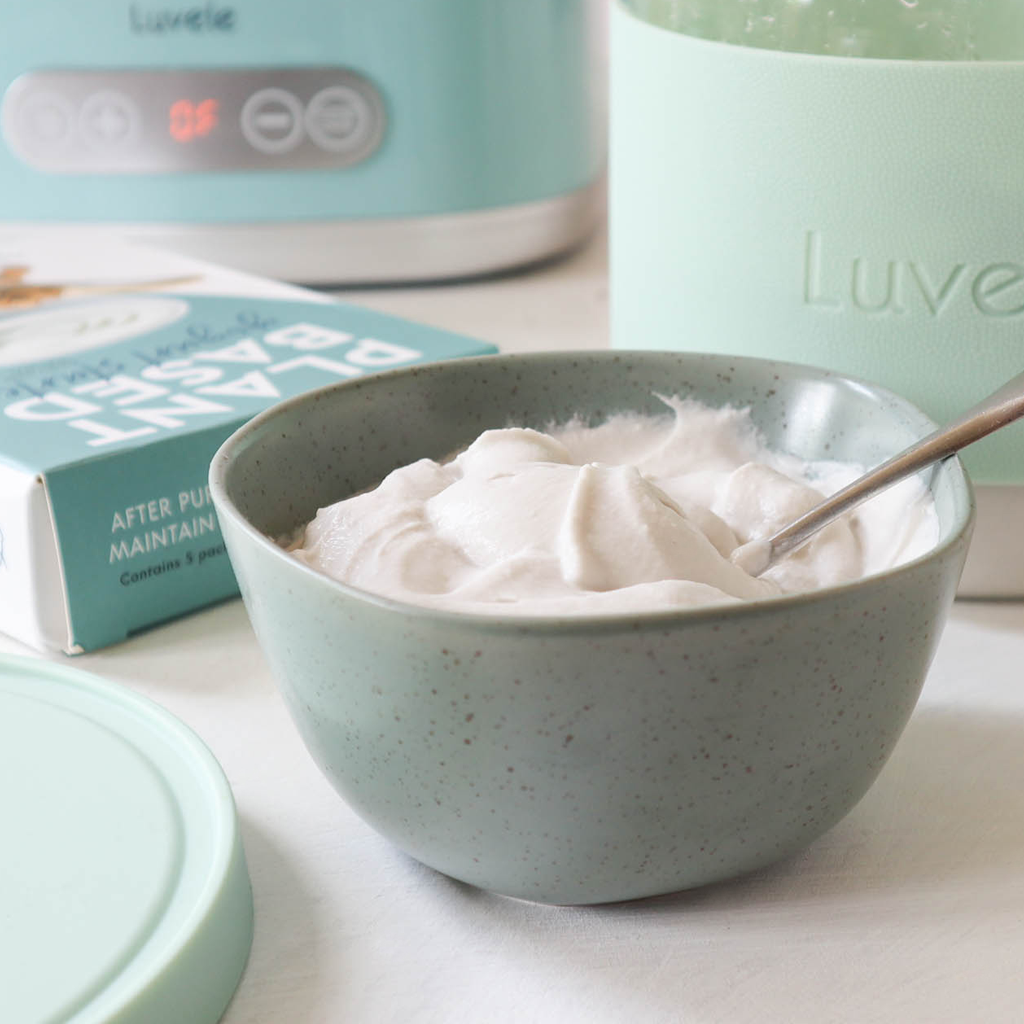
THICKENER
During fermentation, coconut milk does not thicken like dairy yogurt. The Luvele test kitchen has experimented with many different thickening agents to achieve thick and creamy plant-based yogurt. On our recipe blog you’ll find a thickening option to suit every dietary need. We are excited to offer yet another option. Included in the Culture Cupboard Plant Based Starter packet is a ‘base’ thickening agent. The ‘base’ is made up of agar and organic rice starch and guarantees a consistent texture with no separation, every time. Both agents must be heated to activate.
COCONUT MILK
Choose coconut milk or coconut cream that you like the taste of, as the flavour comes through in the finished yogurt. We used Ayam coconut cream, which is commonly found in Australian supermarkets, but any coconut milk will work with Culture Cupboards starter. You could even try making your own coconut milk. Note, the fat content of coconut milk affects the outcome. The percentage of coconut pulp to water makes a big difference to the consistency, and some brands leave in a percentage of oil or contain stabilisers, so expect different levels of thickness depending on the coconut milk you use. If your coconut yogurt is too thick, try adding another can on your next batch. One sachet of ‘base’ will thicken up to two litres of plant-based milk.
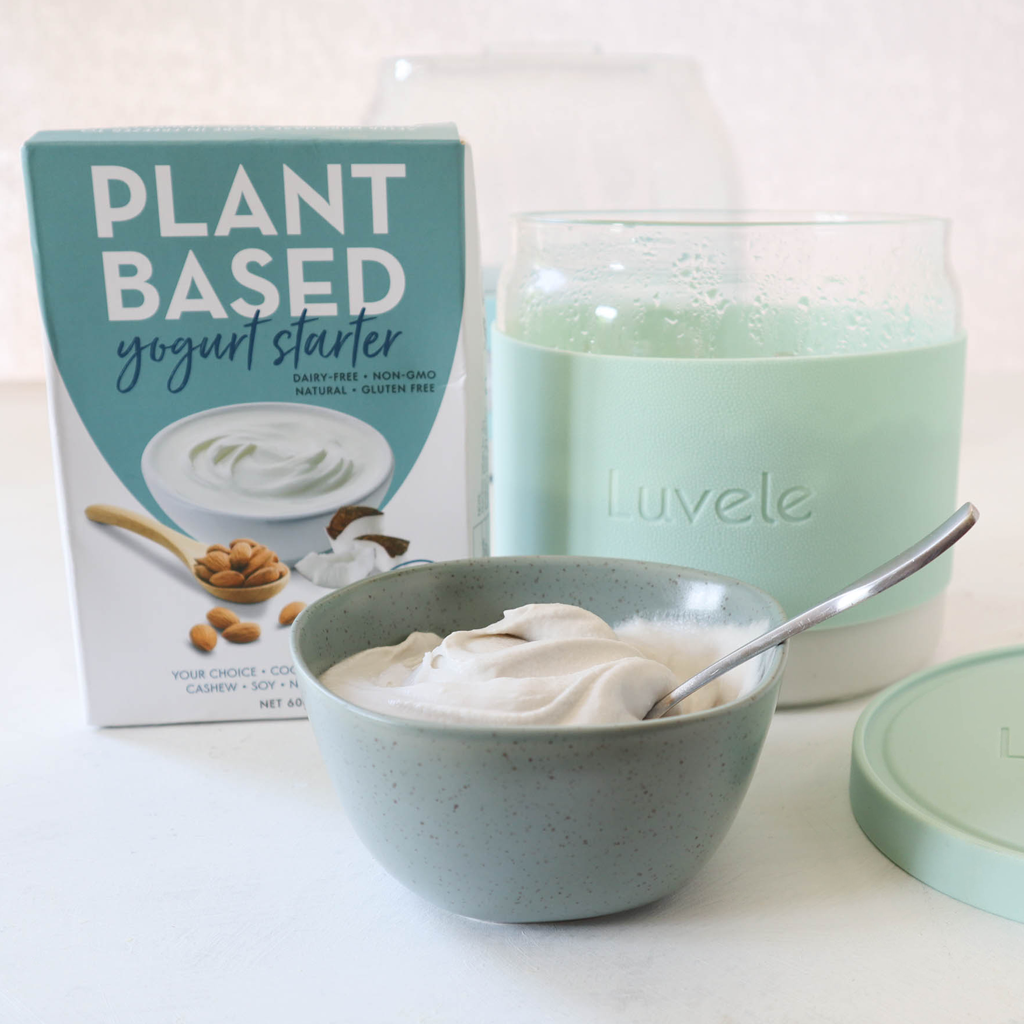
PLANT-BASED YOGURT MADE EASY!
Once you have tried Culture Cupboard Plant Based Yogurt Starter with coconut milk you can experiment and make delicious nut, soy, seed, and oat milk yogurts at home, from either store bought or homemade milks with the same method. Stay tuned, our Culture Cupboard soy yogurt recipe is coming soon.
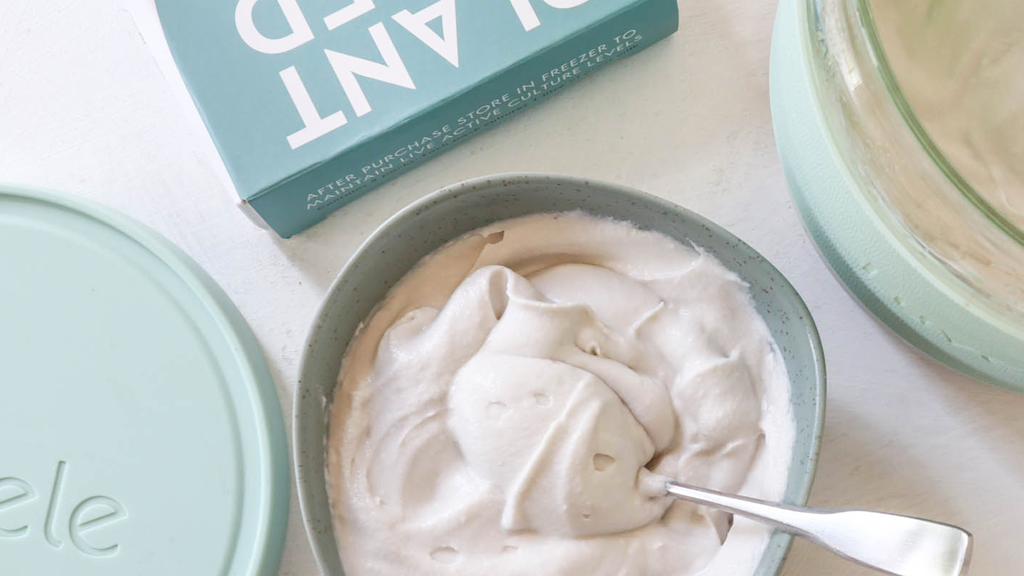
Culture cupboard coconut yogurt recipe
Luvele
Rated 5.0 stars by 1 users
Looking for an easy coconut yogurt recipe? This homemade Culture Cupboard coconut yogurt method is just that and is guaranteed to turn out delicious, creamy yogurt, every time. Culture Cupboard Plant Based Starter contains everything you need to ensure probiotic rich yogurt with great texture.
Ingredients
-
3 cans coconut milk (or up to 2 litres)
-
Culture cupboard plant-based starter
Directions
Before you begin, sterilise the Luvele yogurt making glass jar and any utensils you use, in boiling hot water. Do this by boiling a kettle and carefully pouring the hot water in the jar and over the equipment. The danger of not sterilising is that other bacteria may overpower your culture and affect the quality of your ferment.
Pour the coconut milk into a saucepan.
Add the ‘base’ (larger sachet) from the plant-based starter pack and mix it in.
Blend with a whisk as you heat the coconut milk to 185°F (85°C).
Leave the coconut milk to cool to 113°F (45°C) or below.
Pour the coconut milk into the Luvele yogurt making glass jar.
Add the starter culture (smaller sachet) and whisk well to incorporate. The coconut milk is now ready for fermentation.
Put the lid on the yogurt making jar and place into the yogurt maker. Pour water slowly into the base. The water must not be filled over the ‘tall line’ indicated on the inside wall of the maker. Place the cover lid on top.
Use the digital control panel to set the temperature to 38°C and the time to 8-12 hours (a longer fermentation will increase the probiotics and produce slightly more tang) and then press ‘confirm’ to begin incubation.
Condensation will have collected under the cover lid during fermentation. Take care removing it and allow the water to drip into the water bath, instead of your bench. Switch the yogurt maker off and remove the yogurt jar.
Straight from the maker the coconut yogurt will be warm. Place the yogurt in the fridge for at least 6 hours to set, then enjoy.
Homemade coconut yogurt will last up to 2 weeks refrigerated.
Recipe Video
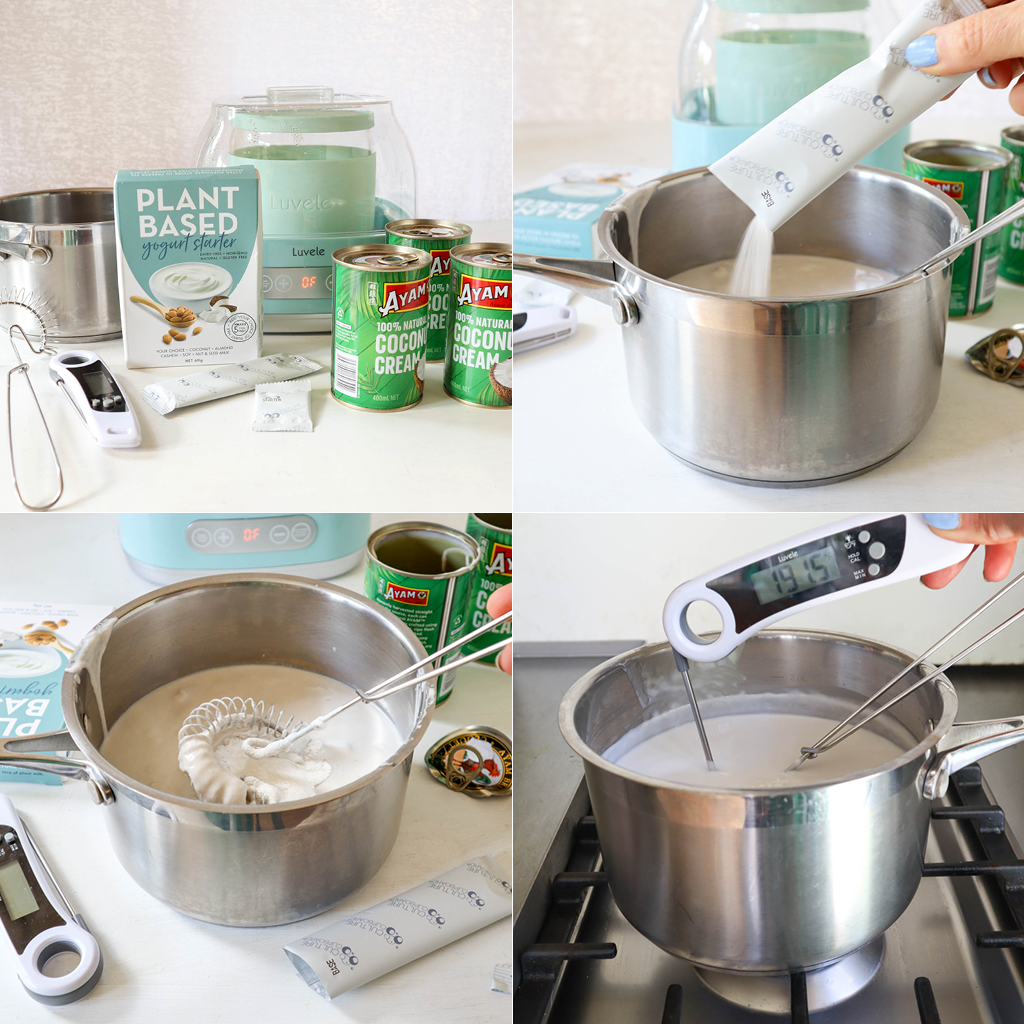
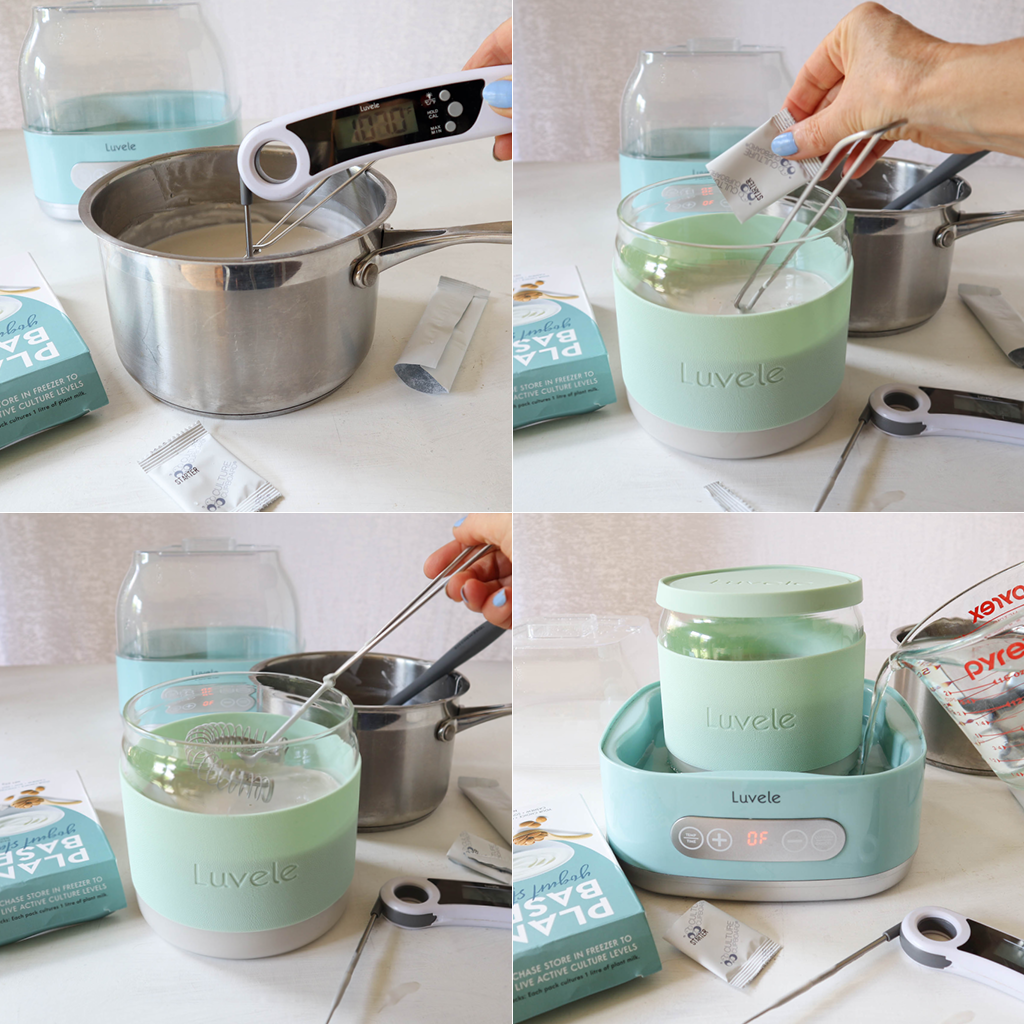

PIN THIS RECIPE


Culture cupboard coconut yogurt recipe

A plant-based yogurt made easy.
Looking for an easy coconut yogurt recipe? This homemade Culture Cupboard coconut yogurt method is just that and is guaranteed to turn out delicious, creamy yogurt, every time. Culture Cupboard Plant Based Starter contains everything you need to ensure probiotic rich yogurt with great texture. It’s everything you love about yogurt, without the dairy!
STARTER CULTURE
Culture Cupboard’s Plant Based Yogurt Starter contains four bacterial strains:
Streptococcus thermophilus
Lactobacillus acidophilus
Lactobacillus delbrueckii subsp.
Bulgaricus bifidobacterium
All the strains are grown in a non-dairy medium so your homemade yogurt will be vegan.

THICKENER
During fermentation, coconut milk does not thicken like dairy yogurt. The Luvele test kitchen has experimented with many different thickening agents to achieve thick and creamy plant-based yogurt. On our recipe blog you’ll find a thickening option to suit every dietary need. We are excited to offer yet another option. Included in the Culture Cupboard Plant Based Starter packet is a ‘base’ thickening agent. The ‘base’ is made up of agar and organic rice starch and guarantees a consistent texture with no separation, every time. Both agents must be heated to activate.
COCONUT MILK
Choose coconut milk or coconut cream that you like the taste of, as the flavour comes through in the finished yogurt. We used Ayam coconut cream, which is commonly found in Australian supermarkets, but any coconut milk will work with Culture Cupboards starter. You could even try making your own coconut milk. Note, the fat content of coconut milk affects the outcome. The percentage of coconut pulp to water makes a big difference to the consistency, and some brands leave in a percentage of oil or contain stabilisers, so expect different levels of thickness depending on the coconut milk you use. If your coconut yogurt is too thick, try adding another can on your next batch. One sachet of ‘base’ will thicken up to two litres of plant-based milk.

PLANT-BASED YOGURT MADE EASY!
Once you have tried Culture Cupboard Plant Based Yogurt Starter with coconut milk you can experiment and make delicious nut, soy, seed, and oat milk yogurts at home, from either store bought or homemade milks with the same method. Stay tuned, our Culture Cupboard soy yogurt recipe is coming soon.
:recipekit:


PIN THIS RECIPE


Subscribe
Sign up to get the latest on sales, new releases and more …
